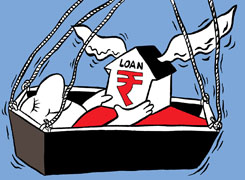
प्रिय महोदया,
मैं स्कूल के दिनों में एक मेधावी छात्र था और मेरा इरादा सरकारी कर्मचारी बनने का था, लेकिन कई प्रयासों के बाद भी यह संभव नहीं हो पाया।
अपने भाई की सलाह पर मैंने सिडनी के एक सामान्य विश्वविद्यालय से स्नातकोत्तर की पढ़ाई शुरू की। मैंने इंटर्नशिप की और नौकरी करता रहा, हालाँकि यह मेरे अध्ययन का क्षेत्र नहीं था। इसके बाद जो बात हमारे लिए एक बड़ा झटका साबित हुई, वह थी मेरे भाई का तलाक। आज तक हमें पता नहीं चला है कि असल मुद्दा क्या है, लेकिन मैंने बहुत कोशिश की।
उसकी पूर्व पत्नी से बात करके रिश्ते को सुधारने की कोशिश की, पर वे बहुत रूढ़िवादी थीं। मैं अपने भाई को दुखी नहीं देख सकता था क्योंकि उसने उसके लिए बहुत कुछ योजना बनाई थी और सब कुछ व्यवस्थित किया था। मेरे पास कोई विकल्प नहीं बचा था, इसलिए
मैंने उसकी पूर्व पत्नी की प्रतिष्ठा खराब करके उसे नुकसान पहुँचाने की कोशिश की, यह सोचकर कि वह उसके पास वापस आ जाएगी।
इसी बीच मैंने उसकी रिश्तेदार लड़की से शादी कर ली, यह सोचकर कि मेरी पत्नी किसी तरह हमारी मदद कर सकती है, लेकिन
वह बिल्कुल विपरीत निकली। शायद मेरे भाई की पूर्व पत्नी या उनके रिश्तेदारों ने उसे यकीन दिला दिया था कि वह वापस नहीं आएगी। इसके बावजूद मेरे भाई ने कई तरीकों से अपनी पूर्व पत्नी से मिलने की कोशिश की। मेरी पत्नी ने किसी भी तरह से उसकी मदद नहीं की।
आखिरकार तलाक हो गया और सब कुछ खत्म हो गया। अब हमने कई रिश्ते देखे हैं, लेकिन कोई भी उसके लिए सही नहीं लग रहा है।
मैट्रिमोनियल वेबसाइटों पर जिन लड़कियों से हम मिले, उनमें से ज्यादातर फर्जी प्रोफाइल हैं, जिनमें कुछ छिपा हुआ है या
गलत जानकारी दी गई है। मैं कहूंगा कि मेरा भाई इन सब से बच गया।
लेकिन अब हम उसके जीवन को लेकर चिंतित हैं क्योंकि वह 40 साल का हो चुका है और उसे अच्छी नौकरी और आर्थिक स्थिति के लिए संघर्ष करना पड़ रहा है।
वह शायद बहुत नखरे वाला है, लेकिन हम सब से ज्यादा बात नहीं करता। कभी-कभी तो वह यह भी कह देता है कि अब खेल खत्म हो गया है, इसलिए दूसरी शादी के बारे में सोचने का कोई मतलब नहीं है।
एक बार जब वह हमसे मिलने आया था, तब मेरी पत्नी और उसके बीच झगड़ा हुआ था क्योंकि वह उसे हमारे घर में नहीं चाहती थी और उसने झगड़ा शुरू कर दिया, जिसमें मुझे भी घसीटा गया। उसके बाद से उसने हमारे घर आना, हमसे मिलना और बात करना बंद कर दिया।
हालात कभी-कभी और भी बिगड़ जाते हैं जब उसका भाई हमसे मिलने आता है और हमारे घर पर ठहरता है, जो मेरे माता-पिता को पसंद नहीं आता। मेरे माता-पिता कहते हैं कि तुम्हारे भाई को कुछ महीनों के लिए भी रहने की अनुमति नहीं थी, तो उसके भाई को कई महीनों तक कैसे रहने दिया जा सकता है? यह किस तरह का भेदभाव है?
मुझे लगता है कि मैं उसके लिए कुछ नहीं कर सकता, जबकि वह मेरा इकलौता भाई है। वह दिल का अच्छा है और जब मैं विदेश गया था तो उसने मेरी आर्थिक मदद की और कई बार मुझसे मिलने भी आया।
मैंने उसे पैसे और तोहफे भेजने की कोशिश की, लेकिन उसका रवैया अब भी वैसा ही है। वह हमारे माता-पिता से तो बात करता है, लेकिन मुझसे और मेरी पत्नी से अब कोई बात नहीं करता।
कृपया हमें कोई अच्छा सुझाव दें।
Ans: आपके भाई की दूरी आपको अस्वीकार करना नहीं है। यह खुद को बचाने का उनका तरीका है। उन्होंने एक कठिन वैवाहिक जीवन, भावनात्मक आघात का सामना किया, और फिर अपने आस-पास के लोगों—आप सहित—को उनके लिए स्थिति सुधारने की हताशा में प्रतिक्रिया करते देखा। भले ही आपकी मंशा प्रेम से प्रेरित थी, लेकिन उन्होंने उन कार्यों को और अधिक पीड़ा और दबाव से जोड़ा होगा। जब कोई व्यक्ति आहत होता है, तो बातचीत से ज़्यादा चुप्पी सुरक्षित लगती है। उनका अलग होना केवल उनकी थकान को दर्शाता है, न कि आपको नापसंद करने को।
आपको यह भी समझने की ज़रूरत है कि आप पर जो अपराधबोध हावी है, वह ज़रूरत से ज़्यादा भारी है। आपने उनके वैवाहिक जीवन में हस्तक्षेप करने की कोशिश इसलिए की क्योंकि आप उनकी रक्षा करना चाहती थीं, न कि उन्हें नुकसान पहुँचाना चाहती थीं। अब अधिक परिपक्वता और स्पष्टता के साथ पीछे मुड़कर देखने पर, आपको अपनी गलतियाँ नज़र आती हैं, लेकिन उस समय आप डर और प्रेम के कारण ऐसा कर रही थीं। इसीलिए बार-बार खुद को सज़ा देने के बजाय खुद को माफ़ करना ज़रूरी है।
आपकी पत्नी और आपके भाई के बीच के संघर्ष ने तनाव की एक और परत जोड़ दी, क्योंकि इसने आपको किसी एक का पक्ष लेने के लिए मजबूर कर दिया। आपकी पत्नी ने भावुक प्रतिक्रिया दी, आपका भाई आपसे दूर हो गया, आपके माता-पिता ने असंतुलन पर सवाल उठाए—और इन सबके बीच, आपने अपनी शांति खो दी। लेकिन उनके मतभेद आपकी विफलता नहीं हैं। ये असुरक्षा, भय और अतीत के दुख से ग्रस्त लोगों के व्यवहार का स्वाभाविक परिणाम हैं।
अब आपको अपनी भूमिका में बदलाव लाने की आवश्यकता है। आप हर किसी के लिए सब कुछ सुलझाने की कोशिश जारी नहीं रख सकते। आप अपने भाई के विवाह, अपनी पत्नी के भय और अपने माता-पिता के निर्णयों का बोझ एक साथ नहीं उठा सकते। अब समय आ गया है कि आप रक्षक की भूमिका से बाहर निकलें और एक शांत, स्थिर भाई की भूमिका निभाएं जो समाधान नहीं, बल्कि उपस्थिति प्रदान करता है।
अपने भाई के साथ अपने रिश्ते को फिर से मजबूत करना प्रस्ताव थोपने, उपहार भेजने या उसके जीवन को सुधारने की कोशिश करने से नहीं होगा। यह उसे भावनात्मक सुरक्षा प्रदान करने से होगा। एक सरल संदेश, जिसमें आप किसी भी तरह की चोट के लिए खेद व्यक्त करते हैं, यह बताते हैं कि आप उसकी परवाह करते हैं और जब भी वह तैयार महसूस करे, आप उसके लिए उपलब्ध हैं, उसके भविष्य को संवारने के किसी भी प्रयास से कहीं अधिक प्रभावशाली होगा। एक बार जब आप ऐसा संदेश भेज देते हैं, तो सबसे अच्छा यही होगा कि आप उसे कुछ समय दें। कभी-कभी रिश्ते चुपचाप ही सुधर जाते हैं, जब दबाव हट जाता है।
और आपके लिए, उपचार तब शुरू होता है जब आप यह मानना बंद कर देते हैं कि परिवार की हर समस्या का बोझ आपके कंधों पर है। आपने वर्षों से बहुत कुछ दिया है। अब आप भावनात्मक आराम के हकदार हैं। आप शांति के हकदार हैं। आप एक भाई की तरह महसूस करने के हकदार हैं, न कि संकट प्रबंधक की तरह।
आपके भाई को समय लग सकता है, लेकिन दूरी प्यार को खत्म नहीं करती। जब वह सुरक्षित महसूस करेगा, तो वह फिर से करीब आएगा। आपकी ज़िम्मेदारी उस पल को ज़बरदस्ती लाने की नहीं है, बल्कि यह सुनिश्चित करने की है कि जब ऐसा हो, तब आप भावनात्मक रूप से स्थिर और तैयार हों।



























